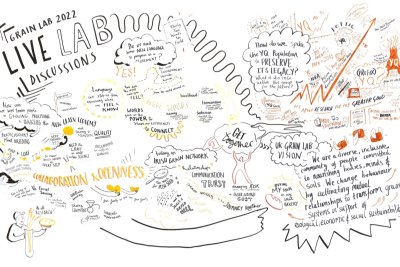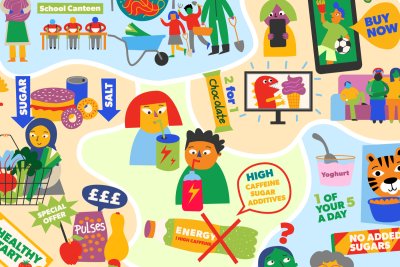Sustain • Coronavirus Food Alert
Our statement on Covid-19
This is the Sustain alliance's statement on Covid-19 coronavirus and food resilience. Statement updated: 23rd March, 2020
Sustain is in the privileged position of being able to help with the response to the Covid-19 coronavirus outbreak. We are highly motivated to do so.
A safe, resilient, equitable and accessible food supply is vital to everyone, and we will do what we can to help secure this, now and in the future. There are some things we must do in emergency mode; and some that are about building the safe, fair, resilient and sustainable systems that we all need for the future.
Through talking and listening to a wide range of frontline groups, we have initially identified some key ways in which we can help. We will share more details shortly, but in essence Sustain will be working with our national policy team and our local networks in the following ways.
Supporting the emergency response
We will support work at national, local authority and community levels, and are redeploying some of our staff, with the support of our compassionate and flexible funders, who understand the need to do so at a time of national emergency. Overall, we are at time of writing less concerned about overall quantity of food, and more concerned with ensuring that it gets to the people who need it and that producers, workers and businesses throughout the food supply chain are properly supported. At this stage, the most important things for Sustain and our alliance members to do are:
- Tackle vulnerability: Ensure that sufficient resources are channelled to where it is most needed. At first, our focus is on food for the most vulnerable – people on low incomes and those most at risk from infection – older people and those with certain health conditions. First and foremost, we are prioritising the need for people to have enough money to buy the food they need. We are also supporting efforts to help very vulnerable people access food. Food banks and voluntary sector initiatives have a role, but will not be able to meet the demand and may not have suitable arrangements to help many of the people needing to self-isolate. We are supporting those working on food for children – especially those in low-income households who may miss out on school meals and holiday hunger support.
- Support the supply chain: Supermarkets and big food supply chain companies have access to policy-makers and targeted support. Sustain is looking at ways to support smaller farmers, fishers and food producers and their diverse market outlets.
- Channel the money: Champion good ideas for where money could be provided into the system to help reduce financial pressures on vulnerable households; keep food enterprises and food supply flowing; and enable effective local authority and voluntary sector action. We will also look at policies that could help reduce costs.
- Influence local response: Working with the food partnerships and food poverty alliances in our Sustainable Food Cities and Food Power networks, help local authorities, Local Resilience Forums and emergency funders to identify what support they need and can offer – coordination, money, cost reductions and guidance on issues relating to enterprise support, continuity of supply and access to facilities such as community centres, markets, storage facilities and kitchens.
- Connect up: Share intelligence from national organisations in our alliance, as well as those local food partnerships, voluntary sector groups, enterprises and local authorities that are taking action at local level with the Westminster government, devolved administrations, funders and other supporters who could help them respond effectively.
- Listen and learn: Talk to people working on the frontline – the farmers, fishers, bakers and other food enterprise owners and workers, supply chain workers, people on low incomes and voluntary groups and others affected by large-scale food system disruption – as well as the specialist associations that work with them. We will develop our own work and priorities dynamically, based on what we hear.
- Communicate: Share stories of effective action at local and national level, aiming to inform and inspire people help in whatever way they can – whether professionally or as individuals. Telling the stories of communities, enterprises, schools and local authorities rising to the challenge of massive food system disruption - frontline stories of food heroism. We will need hope, and we need stories to tell ourselves of how people have the potential to rise up to help each other.
- Signposting: Being a place online where people can find reliable advice and signposting to organisations and experts that can help. We already host some advice that might be relevant, such as setting up food partnerships or food co-ops. We might, in time, signpost to job platforms or platforms for smaller-scale or alternative food supply.
- Convening: Through our working parties, special meetings and webinars, as an alliance, and as an organisation with large networks of practitioners, we are used to bringing organisations to work together, or to feed their views and experiences into policy-making. We could consider develop channels for peer learning, or crisis-specific email forums.
Building a more resilient food system
Sustain is deeply concerned that the Covid-19 coronavirus epidemic is demonstrating the profound lack of resilience in our food system, as did the two rounds of no-deal Brexit preparations during 2019. This causes unnecessary everyday suffering and anxiety, especially to more vulnerable people, particularly those on low incomes, and it means we are taking a negligent approach to the people and natural systems that feed us.
Crises can bring people together or push them apart. They can lead to cynicism and a loss of faith in institutions, or to a deeper understanding of the role that our social and institutional structures can play to “build back better”. Billions will be invested in helping people and businesses to get through this Covid-19 coronavirus crisis. We must use those investments, our refreshed social networks and sense of common purpose, and what we learn through the challenging times to come, to drive a resilient, fair, low-carbon and sustainable system of food and farming that works for everyone.
We are also deeply concerned about the implications for how the UK meets the challenges of the climate crisis. Already we are seeing the speed of adaptation and response at a local and national level to face the current pandemic, and want to insure that solutions will also be suitable for addressing the climate and nature emergency and a just transition.
Sustain has a role in championing better ways of organising and governing our food system. We will:
- Continue to press for effective action to address the root causes of food poverty.
- Continue to press for robust legislation on farming, fishing, international trade, environment and climate change. The resilience of our food system is dependent on a fair and sustainable approach to supporting farmers, fishers, food workers, the environment and nature.
- Develop our work on championing a more diverse and resilient food system, including diverse farming, fishing and food enterprises, fair access to resources, fair trading systems and better routes to market.
- Looking beyond the Covid-19 coronavirus, we will also look at what lessons have been learned from this crisis (and from preparations from no-deal Brexit). We will collect evidence and testimony throughout, to inform future review. We will invite others to share their insights and to campaign in future for specific changes in legislation and policy that could build a better food future.
Guiding principles
In undertaking this work, Sustain will follow and support the following principles:
- Help people to get the food they need, which in turn can help people follow the advice to stay at home, and to support people’s physical and mental health requirements.
- Listen to people and frontline groups, to hear what is needed. Actively seek contact with those who might not otherwise be represented.
- Enable those with solutions to pursue their work more easily.
- Keep safe and help others keep safe.
- Follow public health advice.
- Limit face-to-face contact, but keep up supportive work and social contact by other means.
- Focus on solutions and action.
- Share what we learn, so that others can use it.
- Champion food resilience and system change so that we will all be better prepared in future.
- Ensure that long-term solutions are also considered in light of their impact or benefits in addressing climate and nature emergency and the just transition.
Created by the Sustain alliance team; drafted by Sustain chief executive Kath Dalmeny, who is also a member of the London Food Board; advisor to the London Resilience Forum; advisor to the Sustainable Food Cities Network; and a member of the programme board for Food Power and the End Hunger UK alliance.
Coronavirus Food Alert: Sustain's work on food resilience in the COVID-19 coronavirus pandemic.We are helping secure food for vulnerable people and supporting local emergency responses.


